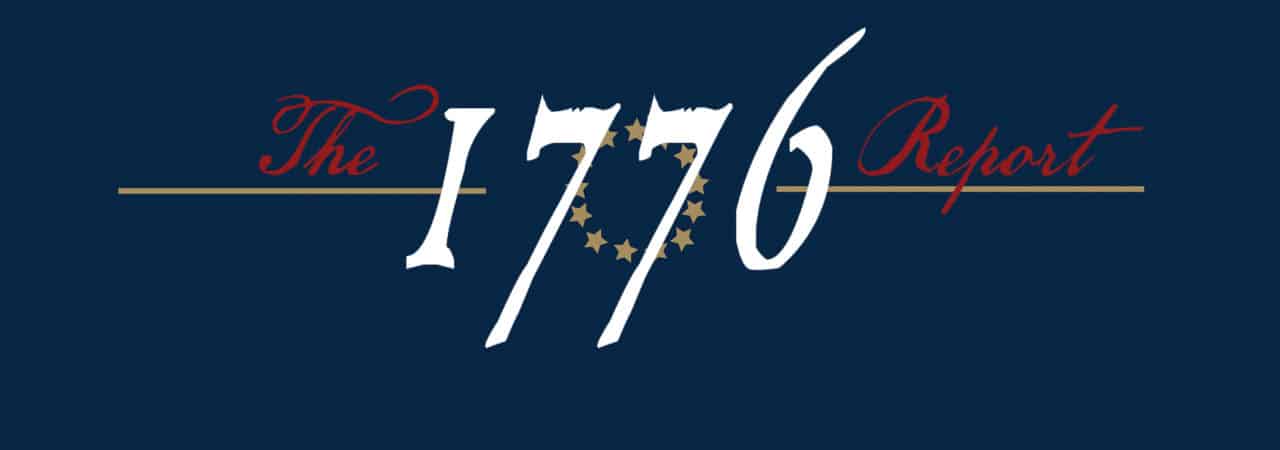
Washington, D.C. — On Monday, May 24, The 1776 Commission met at Hillsdale College’s Washington, D.C. campus to discuss civic education curricula, state civic education reform efforts, pending federal legislation and executive actions, and future activity of the Commission.
Following the meeting, The 1776 Commission issued the following statement (PDF here):
We are grateful for the widespread support of the work of The President’s Advisory 1776 Commission, and we commend the many efforts, some new and many long established, underway to advance the principles and address the concerns voiced in The 1776 Report.
The restoration of American education can only be grounded in a history of America and its principles that is accurate, honest, unifying, inspiring, and ennobling.
This decades-long restoration will only succeed through the great efforts of the millions of good-willed, intelligent, and patriotic Americans, who long, as all human beings long, to know the truth.
There is no more powerful force than parents’ love for their children, and this restoration will depend on mothers and fathers demanding that their children are no longer taught false narratives or fed hateful lies about our country. We affirm, as a bulwark for the protection of American principles, the core constitutional principle that parents have the natural right to direct the education of their children.
All those concerned about education in America should organize and run for school board and vote in school board elections. Through that and other means they can restore the natural sovereignty in education of the school, the place where students, parents, and teachers are united in the sublime work of helping children to grow.
Parents and local school boards will be strengthened in this effort by greater choice and variety in curriculum at the state and local levels. We reaffirm the role of the states and localities in overseeing the nation’s K-12 public educational system, and commend those states and localities that have reformed or are considering reforming their curricula to sustain our common principles and teach our true history to America’s children.
We are concerned that the U.S. Department of Education’s Proposed Rule defining priorities for the American History and Civics Education programs, whether as Critical Race Theory or under the misleading name of “anti- racism,” actually encourages and seeks to direct federal funds to the teaching of racial discrimination in America’s elementary and secondary school systems. This Proposed Rule should be withdrawn, and individual states should oppose any such race-based pedagogy as part of their curricula, especially if that curricula is imposed by the federal government.
The Constitution leaves education to the states and localities and denies the federal government any authority to impose national curriculum standards. The federal government should not circumvent this obstacle by using federal funding to entice states and localities to adopt what it wants taught in the nation’s schools. We learned from the failed Common Core experiment that one-size-fits-all national models are a blueprint for trivializing and mechanizing learning.
Instead, we encourage a genuine civics education that will rebuild our common bonds, our mutual friendship, and our civic devotion and eagerly look forward to the forthcoming release of curricula designed in the true spirit of 1776.
Lastly, recalling the long history of citizen participation in our civic life, we call on states, counties, and local communities to form their own 1776 Commissions to advance this great work of American renewal as we prepare for the 250th anniversary of the Declaration of Independence in July 2026.
The meeting was hosted by Chair Larry P. Arnn, president of Hillsdale College; Vice Chair Carol Swain, retired professor of law at Vanderbilt University; and Executive Director Matthew Spalding, vice president for Hillsdale College’s Washington, D.C. operations and dean of the Van Andel Graduate School of Government.
“History is complete and cannot be changed,” said Arnn. “These controversies about history can only be resolved by looking at the facts. To help the young know this history is the work of the commission, and its importance has not diminished since inauguration day.”
All media inquiries go to Emily Stack Davis, Hillsdale College, at [email protected]. A PDF of The 1776 Commission’s May 24 statement can be found here. Photos from the meeting can be found here. Headshots of commission members can be found here. The 1776 Commission’s letter to the Department of Education can be found here.
About The 1776 Commission
The 1776 Commission was established in 2020 to prepare for the 250-year anniversary of the signing of the Declaration of Independence in 1776 and to combat false narratives about the American Founding, like those proposed by the “1619 Project.” Its first overview document, The 1776 Report, was submitted to the President and released as a public document on January 18, 2021. The President’s Advisory 1776 Commission was abolished by an Executive Order of the next President on Inauguration Day, January 20, 2021. The 1776 Report, which was removed from the White House website on inauguration day, can be downloaded here.